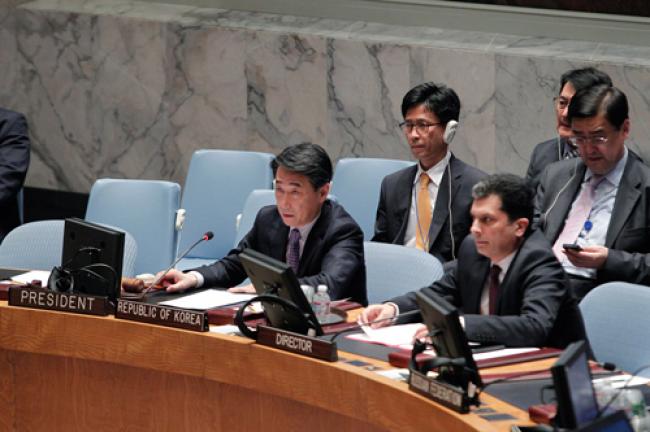In a statement read out to the press by Ambassador Oh Joon of the Republic of Korea, which holds the Council’s presidencyfor May, the 15-members called on all parties to respect “the democratic will of the people.”
They “call upon the security services to respect the constitutional order” including the election results, and reiterated “the demands to the security services to submit themselves fully to civilians control.”
The second round of presidential elections was held on Sunday after citizens first went to the polls on 13 April. Postponed several times, the elections are the first to take place since the 2012 military coup which ousted interim President Raimundo Pereira. They are widely seen as essential to restoring constitutional order, economic growth and development.
“Once again, Bissau-Guineans have demonstrated their commitment to peace and democracy by turning out in large numbers to cast their ballots,” his spokesperson said in a statement from Ban who is currently on an official visit to China.
The successful conclusion of the elections “will go a long way to restoring constitutional order in Guinea-Bissau” and “usher in and consolidate the stability that has eluded the country for too long,” he said.
At UN Headquarters in New York, José Ramos-Horta, Special Representative of the Secretary-General and Head of the UN Integrated Peacebuilding Office in Guinea-Bissau (UNIOGBIS) briefed the Council alongside the chair of the Peacebuilding Commission’s (PBC) Guinea-Bissau configuration, Antonio de Aguiar Patriota.
The 15-member Council will vote by the end of the month whether to renew the UNIOGBIS mandate, and if so, whether to change its mandate.
“The end of the transition is the beginning of a new phase which will require our continued engagement and full commitment to assist the people of Guinea-Bissau,” said Ramos-Horta via video teleconference from Guinea-Bissau. In the immediate post-election period, the newly elected Government would need emergency budgetary support to help it cover outstanding salaries in order to begin the necessary work of rebuilding the State in an atmosphere of calm and stability.
He went on to say that UN agencies, funds and programmes need the necessary support to help them provide technical assistance in effecting reform of the public administration, providing social services and revitalizing the economy.
International financial institutions should make every effort to support the socioeconomic revitalization of Guinea-Bissau, without which the new Government and the restored constitutional order would run the risk of collapsing very soon, he emphasized.
However, he went on to stress: “It is clear that the new, elected State institutions are inheriting a bleak political, social economic and security situation.” Major challenges must be tackled, with acrimonious civil-military relations and issues of civilian oversight yet to be addressed.
The new Government, Ramos-Horta continued, will need to mobilize all citizens to engage in a serious, inclusive and constructive dialogue, he said, adding that a consensual national programme of political stabilization and economic development must be the first step, alongside the fast-tracking of critical security sector reforms.
In helping the National Commission for Planning and Strategic Coordination prepare for the incoming Government, he said, UNIOGBIS has, among other activities, held workshops to identify proposals awaiting the new Government’s approval, which would address the need to update the National Strategy Document on security-sector reform and the rule of law.
“I believe we find ourselves today better positioned, from a technical point of view, to re-engage with Guinea-Bissau,” said Patriota, adding that the UN is also better positioned to devise a comprehensive and more effective strategy in support of legitimate authorities.
He added that the UN will work with the incoming Government on a new set of national peacebuilding priorities. Resources for such work would come in part from a donors conference which Ban has said would be held “as early as possible” to reign the potential of the country and “move past the cycle of poverty and instability.”
Amb. Oh Joon of the Republic of Korea (left), President of the Security Council for May, moderates the Security Council meeting on the situation in Guinea-Bissau. UN Photo/JC McIlwaine
